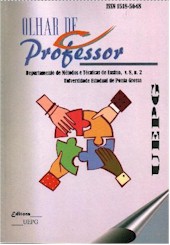O processo de apropriação da leitura e da escrita no cotidiano de crianças de camada popular: uma abordagem histórico-cultural
Conteúdo do artigo principal
Resumo
enfocando o processo inicial de elaboração das questões da pesquisa: como as crianças
se apropriam das práticas de leitura e de escrita no cotidiano em que vivem? O referencial
teórico da História- Cultural (Chartier, 1996 e Hébrard, 1996) possibilitou entender que
as práticas de leitura e de escrita vivenciadas por crianças de camada popular, são
mediadas, entre outros fatores, pelas experiências orais e compartilhadas, as quais são
vivenciadas por elas dentro ou fora da escola. Desde o processo inicial de elaboração das
questões da pesquisa percebi que os relatos das crianças e de suas famílias estavam
relacionados a um discurso histórico amplo, acerca da leitura, marcado, também por
uma prática religiosa intensa. A pesquisa foi desenvolvida na sala onde atuei como
professora, portanto, estive inserida no processo de ensino-aprendizagem e nas relações
estabelecidas com as crianças naquelas circunstâncias. Dessa forma, assumi a
perspectiva apontada por Certeau (1994) na qual o pesquisador, “mergulhado” na
realidade pesquisada, reconhece-se a si próprio como estando implicado pelos usos do
sujeitos que operam no cotidiano.
Downloads
Detalhes do artigo
Autores que publicam nesta revista concordam com os seguintes termos:
a) Os autores mantêm os direitos autorais e concedem à revista o direito de primeira publicação, com o trabalho simultaneamente licenciado sob a Creative Commons Attribution License Atribuição 4.0 Internacional (CC BY 4.0) que permite o compartilhamento do trabalho com reconhecimento da sua autoria e publicação inicial nesta revista.
b) Os autores são autorizados a assinarem contratos adicionais, separadamente, para distribuição não exclusiva da versão publicada nesta revista (por exemplo, em repositórios institucionais ou capítulos de livros), com reconhecimento da sua autoria e publicação inicial nesta revista).
c) Os autores são estimulados a publicar e distribuir a versão onlline do artigo (por exemplo, em repositórios institucionais ou em sua página pessoal), considerando que isso pode gerar alterações produtivas, bem como aumentar o impacto e as citações do artigo publicado.
d) Esta revista proporciona acesso público a todo o seu conteúdo, uma vez que isso permite uma maior visibilidade e alcance dos artigos e resenhas publicados. Para maiores informações sobre esta abordagem, visite Public Knowledge Project, projeto que desenvolveu este sistema para melhorar a qualidade acadêmica e pública da pesquisa, distribuindo o OJS assim como outros softwares de apoio ao sistema de publicação de acesso público a fontes acadêmicas.
e) Os nomes e endereços de e-mail neste site serão usados exclusivamente para os propósitos da revista, não estando disponíveis para outros fins.
______________

Este obra está licenciado com uma Licença Creative Commons Atribuição 4.0 Internacional.

